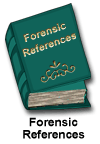|
|
 |
The
required readings for this unit are:
 Australia
Australia |
Required
Reading(s)
|
 |
Insert article
here......................
 Canada
Canada |
Required
Reading(s)
|
 |
Insert article
here......................
 International
International |
Required
Reading(s)
|
 |
Insert article
here......................
 United Kingdom
United Kingdom |
Required
Reading(s)
|
 |
Insert article
here......................
 United States
United States |
Required
Reading(s)
|
 |
| Russell,
M. A., & Noguchi, T. T. (1999). Gunshot |
wounds
and ballistics: Forensic concerns. Topics in
Emergency Medicine, 21(3), 1-9. Retrieved December
24, 2002, from EPSCO Academic Search Premier: http://search.epnet.com/direct.asp?an=7106960&db=aph
- Physicians
are increasingly involved in the medical
care of victims of gunshot wounds. Many of the victims
survive their injuries, and more are likely to do
so as advances in medicine continue. Clinicians
are replacing forensic pathologists as witnesses.
Emergency physicians are among the first
medical personnel to observe the wound characteristics
in their unaltered states and thus have a responsibility
to document these characteristics as accurately
and completely as possible. An understanding of
the fundamental differences in weapons and ammunition
types, as well as a basic understanding of ballistic
principles, will assist the clinician in accomplishing
this task
|
| Silvia,
A. J. (1999). Mechanism of injury in gunshot |
wounds:
Myths and reality. Critical Care Nursing Quarterly,
22(1), 69-74. Retrieved December 24, 2002, from
Academic Search Premier database: http://search.epnet.com/direct.asp?an=6822543&db=aph
- Despite
technological advances, ballistic literature in
the 20th century remains replete with errors, misconcep-tions,
half truths, and false representations. In the majority
of the literature, there has not been a deliberate
attempt to distort or misrepresent the facts but
rather a reliance on myth and misconception. It
is this author's goal to impart a sound, scientifically
supported overview of gunshot wounds and their mechanism
of injury. In doing so, critical care nurses can
care better for individuals suffering from gunshot
wounds and more effectively assist the criminal
justice system
|
Databases
For the full text article online,
sleuth the 'University
of Calgary/ Library/ Article Indexes':
Directions:
- Select
- Indexes and abstracts with links to full text articles
- Select
- Academic Search Premier or Expanded Academic ASAP
- Select
- Connect
-
Fill in
User ID and Pin
- Fill
in search words:
- ballistics
- forensic*
and identification
Top of Page
|
 |
The
'recommended only' readings for this unit are the following:
 Australia
Australia |
Recommended
Reading(s)
|
 |
Insert article/book/chapter
here……..
 Canada
Canada |
Recommended
Reading(s)
|
 |
Insert article/book/chapter
here……..
 International
International |
Recommended
Reading(s)
|
 |
Insert article/book/chapter
here……..
 United Kingdom
United Kingdom |
Recommended
Reading(s)
|
 |
Insert article/book/chapter
here……..
 United States
United States |
Recommended
Reading(s)
|
 |
Insert article/book/chapter
here……..
Top of Page
|

|
Additional
references for this unit can be found in 'forensic
references'
of the forensic sourcebooks.
- Sleuth
'forensic reference' database for:
ballistics
Top of Page
|

|
Video's
recommended for this unit are:
|
|
Resources
(Video)
|
 |
Insert video
here
Top of Page
|

|
The
required websites to sleuth for this unit are the following:
 Australia
Australia |
Resources
(Web)
|
 |
Insert website
here……..
- Note in this
website.....
 Canada
Canada |
Resources
(Web)
|
 |
Insert website
here……..
- Note in this
website.....
 International
International |
Resources
(Web)
|
 |
Insert website
here……..
- Note in this
website.....
 United Kingdom
United Kingdom |
Resources
(Web)
|
 |
Insert website
here……..
- Note in this
website.....
 United States
United States
|
Resources
(Web)
|
 |
Insert article
here......................
Top of Page
|
 |
For
additional websites on this unit, sleuth 'forensic
websites' in the forensic sourcebooks.
- ballistics
- forensic identification
Top of Page
|
 |
|